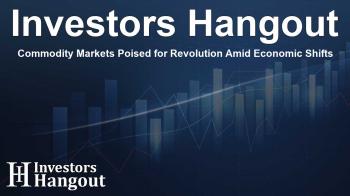Commodity Markets Poised for Revolution Amid Economic Shifts

Commodity Markets Poised for Revolution
The concept of a Commodity Super Cycle has long stirred debate among analysts and economists. Over the years, I've often critiqued the idea, noting how it seemed to describe a much-awaited shift towards tangible assets, contrasting sharply with the world of abstract financial instruments burdened by debt.
While the discussion around this super-cycle was initially met with skepticism due to challenging macroeconomic conditions from 2011 to 2020, a notable shift occurred when the yield of long-term paper assets broke its previously assumed trend in recent times. This pivotal moment has initiated a new economic landscape, one markedly different from the previous decades.
As investors, it’s wise to wait for clear signals from the overarching economic trends. The current landscape hints at a possible slight retreat towards the end of the third quarter or in the fourth quarter before the true rally in commodities kicks off. The stage is being set for what could be the long-awaited “commodity super-cycle,” especially as geopolitical complexities start to influence commodity demand strongly.
Transitioning Economic Landscape Signals Change
The bond market, particularly the multi-decade yield of 30-year Treasuries, illustrates the shift in macroeconomic conditions. This significant change marks the end of an era characterized by a persistent low-interest rate environment and the beginning of what many see as an era focused on commodities.
This new macroeconomic phase is likely to correlate with a resurgence in demand for various critical commodities, including Rare Earth Elements, Palladium, Platinum, and Copper. Additionally, while Gold serves as the anchor of this emerging economic framework, the role of Silver will also grow due to its extensive industrial applications.
Reflecting on past economic policies, we see how previous administrations, particularly during moments of financial turmoil, tended to inflate the economy systematically, which often led to a cycle of profound debt. Former Federal Reserve Chairmen, such as Ben Bernanke and Jerome Powell, played pivotal roles in this inflationary cycle, introducing policies that ultimately severed the long-standing trend of disinflation.
The Impact of Changing Monetary Policies
Powell's inflationary strategies disrupted what had been a stable economic signaling system, leading to the high inflationary expectations we face today. Analysts expect three significant effects to arise from this shift:
- Severe inflationary impacts as new inflationary policies pile onto the existing inflationary framework, in stark contrast to the disinflationary signals previously observed in the bond market.
- The Federal Reserve's influence may diminish in this new environment. The bond market's signals have now become somewhat adversarial to traditional inflationary measures.
- Governments may take more aggressive actions in managing the money supply, potentially resulting in substantial new credit and debt initiatives for public spending.
Historical context is also essential. Over decades, monetary and fiscal policies created the illusion of prosperity, resulting in a misconception of wealth accumulation. Many saw the stock market's growth as a sign of success, but the underlying issues and imbalances often went unaddressed.
Is an 18-Year Bear Market Coming to an End?
Consider the implications for various stock indices, such as the TSX-V, which suffered significant declines during market downturns yet now shows potential signs of recovery and possible transition into a bull market. If the TSX-V progresses successfully, it would reflect years of resilience and recovery after significant setbacks.
This index comprises many speculative commodity stocks, particularly in exploration sectors, which may benefit greatly from the new economic order. Recent movements suggest that a bullish trajectory is forming, with key thresholds to watch, particularly if it crosses a significant benchmark that signals a true reversal of fortunes.
Despite the presence of both promising opportunities and the potential for dubious investments, the evolving macroeconomic backdrop could provide fertile ground for commodity producers and explorers alike to thrive.
Frequently Asked Questions
What is the Commodity Super Cycle?
The Commodity Super Cycle is a long-term trend indicating an increase in demand for tangible assets, driven by economic shifts and global geopolitical factors.
How do changing bond yields influence commodity markets?
Changing bond yields can signal shifts in monetary policy and economic conditions, helping to predict movements in commodity prices.
What role do governments play in the new economic landscape?
Governments may implement aggressive fiscal policies to manage the money supply, influencing market conditions and commodity prices.
Why is gold considered an anchor in the new macroeconomic framework?
Gold is viewed as a stable asset during times of economic upheaval, serving as a hedge against inflation and currency fluctuations.
Are we seeing a transition from a bear market to a bull market in commodities?
Many analysts suggest that the current economic environment indicates a potential end to the long-standing bear market in commodities, paving the way for future growth.
About The Author
Contact Lucas Young privately here. Or send an email with ATTN: Lucas Young as the subject to contact@investorshangout.com.
About Investors Hangout
Investors Hangout is a leading online stock forum for financial discussion and learning, offering a wide range of free tools and resources. It draws in traders of all levels, who exchange market knowledge, investigate trading tactics, and keep an eye on industry developments in real time. Featuring financial articles, stock message boards, quotes, charts, company profiles, and live news updates. Through cooperative learning and a wealth of informational resources, it helps users from novices creating their first portfolios to experts honing their techniques. Join Investors Hangout today: https://investorshangout.com/
The content of this article is based on factual, publicly available information and does not represent legal, financial, or investment advice. Investors Hangout does not offer financial advice, and the author is not a licensed financial advisor. Consult a qualified advisor before making any financial or investment decisions based on this article. This article should not be considered advice to purchase, sell, or hold any securities or other investments. If any of the material provided here is inaccurate, please contact us for corrections.

